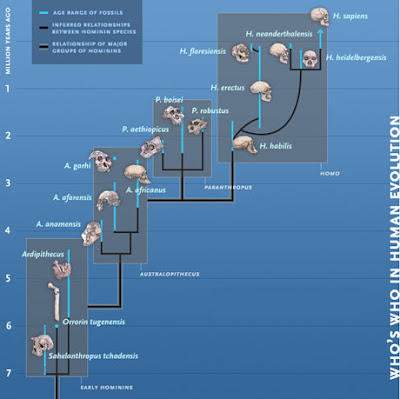So this past week, an article appeared in The Guardian making a move away from the completely liner thinking dogma that has imprisoned paleoanthropologists and others in the human evolution field for decades.
In the past, the theory, stated as fact, was that ALL modern humans evolved from one family group with one mitochondrial Eve. And that most of this evolution has occurred in the last 250,000 to 500,000 YAG, after millions of years basically remaining intelligent apes.
The map is from an article in late 2016 that still promotes that while some of the migration details of other maps are "inaccurate" that this map is the least inaccurate one to date. Even if more than 15 years ago I would have argued that this model is wrong and lacking, without all the research, reading, and study that I have done in the ensuing years up to the present, I cannot grasp how supposedly intelligent students in the various related fields do not use their own logic and reason with rational thought and question all of it. Thus the result from all of this self-study of the question "What and or where are man's origins?" instead of becoming more certain of the official dogma, I have become certain of one glaring fact - - We Do Not Have A Clue!
The first argument the dogma propagandists throw at the rebellious divergent is all the oldest hominid specimens have been found in Africa, East Africa specifically, thus there is no doubt about the origins of homo sapiens sapiens, of course the reality is that academia has focused their search exclusively to East Africa, thus basically eliminating finds in other areas. In light of this dogged determination to stick to their story, there are still finds accidentally stumbled upon in other parts of the world, such as homo floresiensis and homo gigantopithecus, which while labeled as an ape member of the primate family, some researchers claim some possible familiar human behavior and even some possible interbreeding with homo erectus.
Other bumps in the official dogmatic linear evolution process that originally had offshoots of our evolution process just dying off, cause they were not as adaptable, intelligent or modern as we are, are being proven incorrect. It has been proven that while geneticists label the majority of human genome as junk DNA (translate as they don't have a clue), in the parts that they have figured out, they have admitted that significant groups of the modern population have at least 3% Neanderthal DNA (Homo neanderthalensis) and that others also have at least as much Denisovan DNA (Homo sapiens denisova) within their gene pools.
Thus, while there is still a very long way to go in the halls of academia before even seeing the truth on the horizon, the step forward that now allows modern humans to have originated in multiple places in Africa is a step closer to greater knowledge and understanding of our past and our history. With new knowledge, new finds, and the possible acceptance of accessing existing finds with more interest and less hostility, we might once again be moving forward in our search for the origins of our species.
 |
| via arstechnica.com |
The map is from an article in late 2016 that still promotes that while some of the migration details of other maps are "inaccurate" that this map is the least inaccurate one to date. Even if more than 15 years ago I would have argued that this model is wrong and lacking, without all the research, reading, and study that I have done in the ensuing years up to the present, I cannot grasp how supposedly intelligent students in the various related fields do not use their own logic and reason with rational thought and question all of it. Thus the result from all of this self-study of the question "What and or where are man's origins?" instead of becoming more certain of the official dogma, I have become certain of one glaring fact - - We Do Not Have A Clue!
 |
| via PBS NOVA |
Other bumps in the official dogmatic linear evolution process that originally had offshoots of our evolution process just dying off, cause they were not as adaptable, intelligent or modern as we are, are being proven incorrect. It has been proven that while geneticists label the majority of human genome as junk DNA (translate as they don't have a clue), in the parts that they have figured out, they have admitted that significant groups of the modern population have at least 3% Neanderthal DNA (Homo neanderthalensis) and that others also have at least as much Denisovan DNA (Homo sapiens denisova) within their gene pools.
Thus, while there is still a very long way to go in the halls of academia before even seeing the truth on the horizon, the step forward that now allows modern humans to have originated in multiple places in Africa is a step closer to greater knowledge and understanding of our past and our history. With new knowledge, new finds, and the possible acceptance of accessing existing finds with more interest and less hostility, we might once again be moving forward in our search for the origins of our species.
Comments
Post a Comment